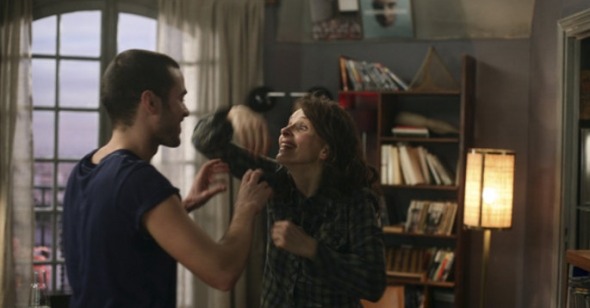People Person
by Sarah Silver
Paris
Dir. CĂ©dric Klapisch, France, IFC Films
Writer/director Cédric Klapisch, who favors large casts and multiple storylines (think Crash, not Nashville), is known to middlebrow America for his Tautou-touting 2002 L’auberge Espagnole and its 2005 sequel, Russian Dolls, which center around Frenchman Xavier (Romain Duris) and his wild and crazy college year abroad in Barcelona surrounded by like-minded youths from other European Union countries. In Paris, Duris is once again a cog in the Klapisch machine, but this time the attention is more evenly spread out across the cast members, and he’s now dealing with older characters (Duris, now in his mid-thirties, is the youngest main character). Klapisch has grown as a filmmaker—gone is the onanistic narration, along with much of the cloying CGI used to illustrate inner thoughts and feelings, and the result is a subtler, more mature variation on a theme.
During the film’s opening, the camera democratically moves through the streets lighting on people who will become major players, as well as transient extras, suggesting that everyone is a potential protagonist. We graze the shoulder of Roland (Fabrice Luchini) and swoop down to meet Pierre (Duris), who, we learn, is suffering from a potentially fatal heart disease. After nearly following a cyclist in a red herring of a camera movement, we pan back over to the bakery owner he’s just biked past. Cut to a woman pointing out landmarks to her children; she’s Elise (Juliette Binoche), Pierre’s sister and a downhearted social worker. There’s also the man sending a postcard to his brother in Cameroon, the television host, the group of open-air marketers, the runway models, and surely some others I’m forgetting in what becomes a disorienting montage ending with anachronistic footage of Duris dancing in what looks like a Claude François television appearance circa 1977 (which momentarily led me to believe that he was meant to be playing his own father).
We garner from this Slacker-esque beginning that Paris will be a portrait of city-as-organism, with individuals functioning as buzzing molecules keeping the whole beast running. Many of the overlapping plotlines would be hackneyed if handled individually, and one gets the sense that, as Klapisch ladles on more and more stories, he’s attempting to mask weak writing with clever structure (particularly in the less developed sketches, like the quest of the Cameroonian man and the tacked on interaction between the models and the marketers).
Fortunately, he is a deft enough director who has, for the most part, cast very wisely, and the work he’s done with his lead actors pays off. Roland’s seduction of an impressionable young student could easily have come off as offensively predictable, but Luchini continually refreshes a tired archetype, his grappling with existence reading in his ephemeral facial expressions (from self-loathing to confusion to delight) as he describes his ingénue (Inglourious Basterds’ Mélanie Laurent). Meanwhile, a wickedly good Karin Viard offers a succinct, biting caricature of petite bourgeoise as the priggish owner of Pierre’s local boulangerie, one that never crosses over into grotesquerie.
For a movie about the city of love, there is a distinct lack of sex in Paris. Instead there are individual dance performances for lovers, by lovers, in moments when words no longer suffice. When Roland does a lively boogaloo for his capricious young lover (he is as enamored with Wilson Pickett as he is Baudelaire), and Elise performs a bulky striptease (managing to find eroticism in sweaters and boots) for the man she has been coyly flirting with, these stars are at their most vulnerable and beautiful. Pierre does his fair share of dancing at a party, but cannot tempt an old flame to sleep with him in what may be his final weeks on earth. In perhaps the least believable scene, he resigns himself to making out with Elise’s insufferable coworker.
Strained connections like this one, and the suggested but undeveloped bond between a Parisian runway model and a Cameroonian hotel worker, would have been better left out altogether, as they not only take up time that could be used to further strengthen other stories but also threaten the fragile validity of those stories merely by being juxtaposed with them. Ultimately there are just as many forgettable scenes as there are memorable ones in Paris. Though it is not without its pleasures, it is a portrait of a city painted in broad strokes, like a souvenir made by a Montmartre artist, hawking his wares to susceptible tourists.
